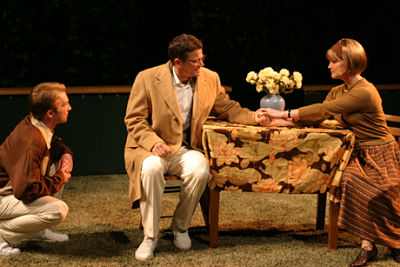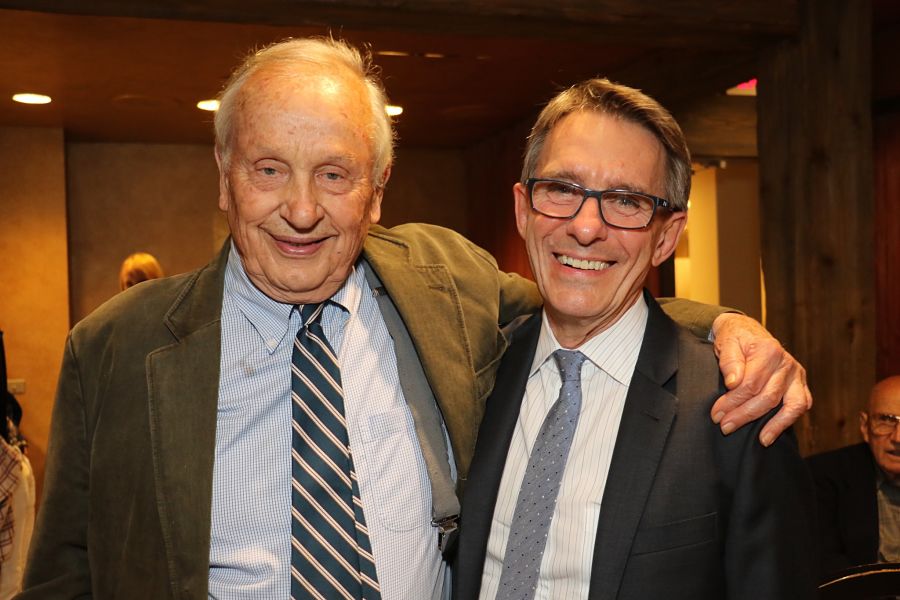Playwright A.R. Gurney, who went by the name of Pete everywhere except in playbills, died on June 13 at the age of 86.
I remember dropping by a matinee performance of Pete’s The Grand Manner during its run in the Mitzi Newhouse at Lincoln Center Theater a few seasons ago. Though I had directed it, I sat with the stage manager and watched Kate Burton and Bobby Steggert in a state of grateful wonder. They were keeping a scene afloat with a combination of skill, charisma, and technique. The scene itself was as light as a soufflé; it contained neither subtext nor conflict, there was just the passing of information, questions asked, questions answered, between a middle-aged star actress and a young man.
The audience, fully visible from the stage manager’s booth, watched, like me, spellbound. The scene was a “getting to know you” scene in which two characters crossed a generational divide with mostly small talk. Small, delightful, intelligent, witty, rueful talk. Yet it lasted almost 20 minutes—a testament not only Bobby and Kate’s superb acting but also to a one-of-a-kind playwright.
Once when Pete returned from a fishing trip with one of his sons and two grandsons, he told me he’d spent nights around the campfire teaching the boys what “conversation” meant. It meant to listen, to then talk, to find interest in what the other person said. He was instructing his grandsons in how he wrote plays. Almost every scene in a Gurney play is a kind of interview, one character asking another questions and getting answers. The answers then develop into more queries, the conversational ball is tossed back and forth, and the scene segues into another—or ends—gracefully. Rarely is there any conflict.
How could this be, I wondered, as I began directing his plays. Conflict is the essence of drama, isn’t it? Perhaps—but conflict is the antithesis of the Gurney mode. A couple of his characters in other plays admire people who can “keep the ball in the air” in conversation as well as life. Pete loved tennis, and when I directed Big Bill, about the gay WASP tennis player Bill Tilden, Pete took me to watch some professional women’s tennis matches. “The way the women play is much more like the classic tennis I remember from my youth,” he said. “There’s more grace, they keep the ball in the air more.”
And as I worked on other scripts of his, I thought about Henry James, and how the conflicts in his best novels are the result of character more than action. Trollope functions this way too: His plots are of secondary importance to the colliding of contrasting characters. And John Cheever’s short stories, which covered the same WASP ground as Pete’s plays but in a different way entirely, also pointed the way toward dramatic conflict that was hidden or shimmering with transparency, muted but in a way that keeps the reader utterly involved.

The variety surrounding the conflicts, however muted they are in those writers’ works, also gives color to their prose and observations about humanity. And so it was, for me, as I discovered the delicate, rueful, often very funny skeins in Pete’s plays, from Big Bill through Black Tie, about a father passing on supposedly outmoded traditions and values to his son (pitch-perfect performances by Daniel Davis and Gregg Edelman), to Buffalo Gal, Grand Manner, and a revival at Westport Playhouse of one of his very best, The Dining Room.
After spending many years directing large-scale classical plays by Shakespeare, the Greeks, and others, as well as grand opera, I took particular delight in the unique and extraordinary challenges of these small scenes. It was new territory for me. I had known Pete professionally for years, since we programmed two of his plays at Hartford Stage during my tenure there. But when I began freelancing, my now-husband and I left Hartford and moved to a relatively rural area in western Connecticut, not far from where Pete lived with his wife, Molly.
Soon we became even closer friends, sharing dinner parties and get-togethers, until one day Pete asked me to direct a premiere of his at Williamstown Theatre Festival in the Berkshires. An artistic collaboration deepened our friendship. He deeply admired the directors he worked with repeatedly: Joey Tillinger, Dan Sullivan, Jack O’Brien, Jim Simpson. He listened to ideas from all of us, collaborated with all of us. He never seemed intimidated or flummoxed, and he would agree and disagree with equitable poise. This always gave a civilized air to the rehearsal hall and the work that proved invaluable.
Pete was infatuated with the theatre, and he wrote every morning in his rambling Roxbury home, usually with the dog at his feet. We shared a love of dogs as well. We shared a love of laughter in the rehearsal hall, and it was delightful for the actors when he was present, for he adored them, their bravery, their generosity of spirit. Something easy for him to lob back at them.
He admired and praised the successes of others; he never showed any jealous or negative streak (unless it involved Republicans). All his friends loved that about him. Both avid readers, we would share books and book suggestions, from the Aeneid to Romeo: The Story of an Alaskan Wolf, from Seabiscuit to Barnaby Rudge (Molly had read all of Dickens—we began to do the same, of course).
His kindness meant a great deal to me. Years ago, shortly after a musical revue of mine had opened to mostly negative notices on Broadway, Pete called. Out of the blue.
“Now don’t let those damned notices get you down,” he said. “Don’t get dispirited—you’re too good for that.” No other friend had said a word to me since the opening night. Just Pete. My eyes swelled with tears and I got a lump in my throat. He had reached out. He knew. He was civil, brave even, to do that. He helped me keep the ball in the air that day, and the buoyancy of his plays and the depth of his friendship have informed the last 20 years of my life while providing unending delight to audiences and actors.
Mark Lamos, who has had a long and distinguished career as a director, is artistic director of Westport Country Playhouse.


